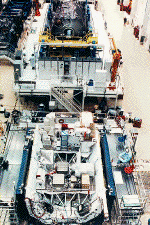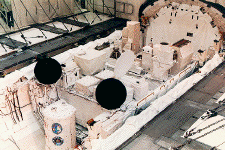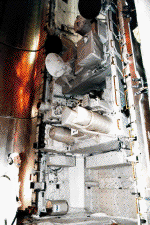Integration of ATMOS Instrument on the Shuttle

ATMOS flew on the ATLAS missions
in the payload bay of the orbiter, exposed to space when on orbit. It was one
of several other instruments mounted on the ATLAS pallet, which provided them
the power, cooling, commanding, and communications links. The images here show
the steps of integrating ATMOS and the ATLAS 1 pallet into the orbiter Atlantis.

 |
Integrating Instruments on
the ATLAS Pallet
Shown here are two payloads being prepared for separate shuttle missions,
inside the Operations and Checkout Building at Kennedy Space Center (KSC).
In the foreground is the ATLAS 1 Payload. ATMOS is covered with the silver
blanket (a protective -or dust- cover), on the middle left side. The instruments
sit on top of the pallet (the white and gold platform supported by white
bars). An integration engineer sits at right, in blue. The test being
performed ensures there are no conflicts between the instruments for power,
commanding, and communications.
|
 |
Placing the Pallet in the
Payload Bay
Here, the fully integrated ATLAS payload has been placed in the shuttle
bay of Atlantis while the orbiter is in landing position (horizontal), inside
the Operations and Checkout Building at KSC. ATMOS is now covered with the
white Multi-layer Insulation blanket to protect it from thermal (or temperature)
extremes in space. In the picture, ATMOS is located to the right of the
black sphere at the far side of the orbiter, and behind the instrument with
the dish. |
 |
Testing the Payload in the
Orbiter
Final testing of the payload and the entire orbiter system is done with
the shuttle now upright inside the Payload Changeout Room on the launch
pad. ATMOS is just right of the MAS antenna dish. Note the gold open payload
bay door to the left.
Once all payload integration and testing is completed, the payload bay
doors are closed, and the fuel tank and booster rockets are integrated
with the orbiter. The entire assembly is rolled out to the launch pad
in this upright position, where it is prepared for liftoff.
|

 Go back to the previous page.
Go back to the previous page.
|



